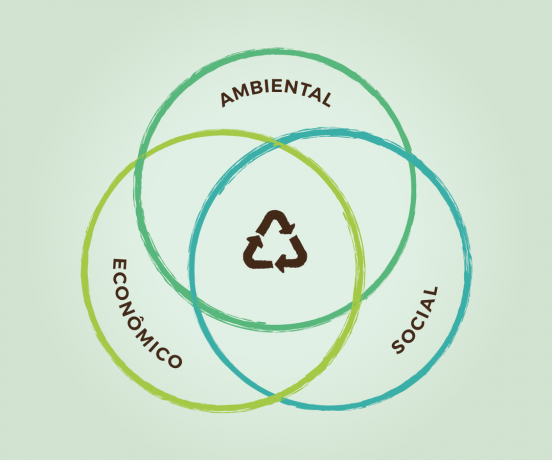Environmental sustainability is using natural resources responsibly, to ensure that they continue to exist and can be enjoyed by future generations.
The concern with sustainability is fundamental to reduce environmental problems such as pollution, greenhouse effect, global warming, extinction of animals and plants and the depletion of natural resources.
One of the biggest challenges in applying environmental sustainability measures is finding a balance between the economic and social development of a country and the preservation of the environment.
How did environmental sustainability come about?
The concern with the sustainability of the environment emerged in the 1970s, when the need to preserve the environment began to attract attention. The perception of the damage that resulted from the increase in industrialization, which began in the 19th century with the Industrial Revolution, was crucial for understanding this need.
But it was only in the 1980s that the UN World Commission on Environment and Development created the expression and suggested the first measures of environmental sustainability.
The sustainability tripod
The concept of sustainability is fundamental to understanding sustainability. It is based on the union of the three most affected focuses: environment, society and economy.
For sustainability to become a reality, the three areas must be considered together and the measures created must cover all these interests.
 The sustainability tripod contains the three most important pillars of environmental sustainability.
The sustainability tripod contains the three most important pillars of environmental sustainability.
How to help with environmental sustainability?
Some simple attitudes can be adopted for a more sustainable day-to-day life focused on environmental protection:
- use water carefully, avoiding waste and reusing water whenever possible;
- do not throw garbage on the ground or in nature, garbage can contaminate the soil and clog the water outlets;
- create the habit of separating and recycling household waste;
- avoid consuming products with packaging or plastic bags, this material does not decompose and causes a lot of damage to nature;
- using public transport or other more sustainable transport such as bicycles and car rotation to reduce carbon dioxide emissions into the atmosphere;
- use creativity and reuse materials and objects instead of buying new products;
- rethink consumption habits and consume more sustainably;
- compost to reduce organic waste and produce natural fertilizers.
Know more about compost and sustainable consumption.
How to apply sustainability in companies?
Like people, companies can also adopt measures that are environmentally sustainable:
- reduce the excessive use of natural resources (this applies to both renewables and non-renewables);
- assess the environmental impacts of its activities and create policies to reduce them;
- using sustainable technologies such as rainwater harvesting for indoor use and solar panels as an energy source;
- use recycled materials in packaging and other products produced or consumed by the company;
- reduce consumption of non-recyclable materials;
- recycle paper, packaging and other materials used in the company's activities;
- reduce the emission of pollution, mainly in industries;
- create education and social inclusion programs for communities close to the company.
In addition to all these measures, companies can also invest in making employees aware of the importance of adopting more sustainable habits.
What are the benefits of sustainability for the environment?
The most important benefit is the preservation of the environment to ensure that the planet will remain healthy and that future generations can also live well and enjoy nature's resources. A preserved planet also guarantees a better quality of life for all people.
Sustainable measures also help to maintain the balance of the environment and all its ecosystems. As a result, the preservation of animal and plant species greatly increases.
Another benefit of sustainability is the reduction in the risk of serious environmental accidents, such as floods, water contamination, dam failure and cyclones.
Meet others ways to help preserve the environment.
Environmental sustainability in Brazil
The concern with environmental sustainability in the country has grown a lot in recent decades, especially since the 1990s. Due to its large land area and location, Brazil is a country with a lot of diversity, having several ecosystems and natural reserves that need to be preserved.
As in the rest of the world, in Brazil one of the biggest challenges is to balance economic activities, social well-being and the preservation of the environment.
Among the main problems faced in Brazil are: pollution, deforestation and the large amount of garbage that is not yet recycled. The solution to these problems involves creating more sustainable policies that are efficient in reducing the impact of industries and activities such as agriculture and livestock.
Experts indicate that the areas of greatest attention to environmental sustainability in Brazil should be:
- reduction of deforestation and preservation of native species;
- reduction in the emission of greenhouse gases;
- control of pollution and soil impoverishment;
- improve environmental disaster response planning;
- better use of water;
- make citizens aware of the importance of adopting sustainable measures;
- encouraging the adoption of sustainable measures by companies.
See also the meaning of sustainability and meet others examples of sustainability.
